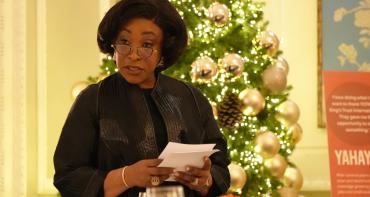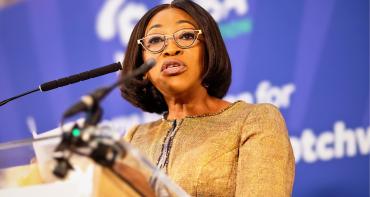In a wide ranging interview with the BBC, Secretary-General Scotland made clear her determination to deliver on the mandate given to her by Commonwealth leaders at their summit last year, at which she received the unanimous support of 53 heads of government.

Secretary-General Patricia Scotland has put forward her case for transformative change at the Commonwealth Secretariat to ensure it can deliver on the ambition and scope of the Commonwealth Charter, CHOGM Mandates and commitments made by member states to the Paris Agreement for Climate Change, as well as the Sustainable Development Goals on ending poverty and inequality.
In a wide-ranging interview with the BBC, Secretary-General Scotland made clear her determination to deliver on the mandate given to her by Commonwealth leaders at their summit last year, at which she received the unanimous support of 53 heads of government.
She said: “When I was elected I was told that reform was a fundamental part of what we needed to do. Not least because the global position had significantly changed as a result of our agreement to the UN development goals and commitments made pursuant to the COP21 climate agreement in Paris.” Secretary-General Scotland, who took office in April 2016, also addressed concerns over the Commonwealth Secretariat’s financial position, noting that the “the budget has certainly tightened” in recent years.
“Many countries are going through a quite difficult time fiscally. There is about a £10 million difference between the budget that was there four years ago and the budget that will be there next year. I have inherited that position and it was clear when I took on the job that reform was going to be necessary because of that new fiscal reality.”
To deliver on the change mandate she was given, the Secretary-General brought in a transition team immediately upon taking office to start the change management process and launched a swift and comprehensive review of the Commonwealth Secretariat, which will result in a streamlined organisational structure.
“I was told by everyone there was real reform that needed to be done expeditiously and properly,” she told the BBC, adding that contrary to media speculation procurement rules were complied with at all times in the hiring of the transition team.
During her first few months in office, the Secretary-General has produced immediate results, delivering summits on climate change and women and a global anti-corruption conference. She has also convened meetings of Commonwealth finance, foreign, health, youth and women’s ministers. Last month she was named woman of the year by Asia, in recognition of her outstanding work and public service.
The Secretary-General is glad to have received the support of Commonwealth leaders which was reiterated most recently by High Commissioners in Singapore during her visit.
She said: “Now there may be those who don’t want reform, who want us to be back where we were with no change. Well change has to happen because we have to be a cost-efficient, cost-effective organisation, which delivers for the 2.5 billion people we are serving."
Addressing inaccurate media reports about renovations to the Commonwealth Secretary-General’s official residence, the Secretary-General noted that works were agreed by the Commonwealth Secretariat and her predecessor before she took office. “Part of the lease agreement is they’ve got to look after the building,” she said. The budget for renovations was included in the organisation’s annual budget and approved by the Commonwealth Secretariat’s Board of Governors and the last Secretary-General.
Interior designer Nicky Haslam was asked by a representative of the Commonwealth Secretariat to provide pro bono advice on the refurbishment. In a short statement issued today, Mr Haslam said:
"The Secretary General made no specific requests to me and it was clearly understood that those suggestions would be reviewed on a case by case basis. To the best of my knowledge, virtually none of the suggestions made were taken forward given budgetary constraints. It is entirely wrong to suggest these demands were made by the Secretary General or that this list of activities was actually undertaken.” In her interview, Secretary-General Scotland confirmed that she had insisted that the costs of the refurbishment be curbed. “I was really clear about this: there had to be no extravagance whatsoever,” she said.
The Secretary-General was speaking on 4 November, the day the Paris Agreement on Climate Change came into force. This she hailed as a “wonderful moment” which will bring hope for small and vulnerable developing countries, many of which face an “existential threat” from climate change. The Paris Agreement of December 2015 built on an historic climate change declaration issued by Commonwealth Heads of Government at their summit in November 2015. Global ratification of the agreement was “the start of the process” to support threatened countries to mitigate and adapt to climate impacts, she said.
The Commonwealth, which last week brought together experts to look at practical solutions to climate change, can play a leading role in implementation and can help countries to access available climate finance, the Secretary-General added. “We’ve got a huge opportunity to come together now to look at biomimicry, regenerative processes, what works and doesn’t work, and also enabling these small states in particular, but others too who are made vulnerable,” she concluded.



